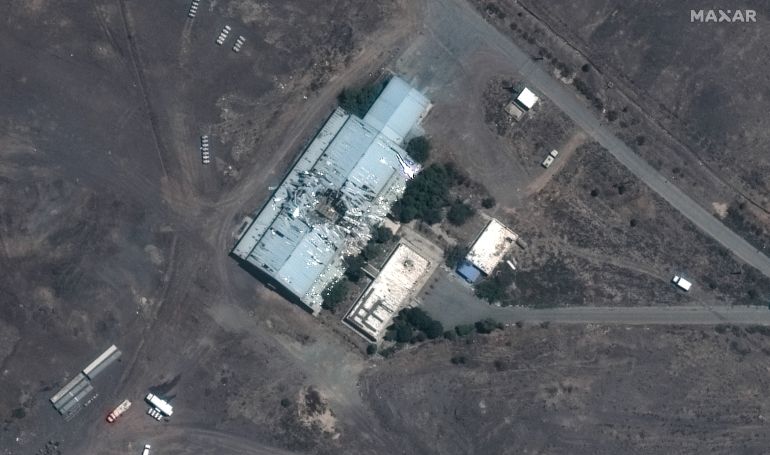Israel and Iran have launched more strikes on one another overnight and into the morning as the military confrontation between the two traditional adversaries persists.
Iranian attacks on Israel on Monday morning killed at least eight people and wounded dozens, officials reported, while Tehran said Israeli attacks overnight hit military and civilian targets.
The mutual strikes pushed the death toll from four days of open conflict between the foes close to 250.
Raised rhetoric emanating from both countries following the strikes suggested there is little prospect of the hostilities halting soon, with the risk of an escalation into a wider regional conflict persisting.
Iran announced it had launched some 100 missiles and pledged further retaliation for Israel’s sweeping attacks on its military and nuclear infrastructure, which have killed at least 224 people in the country since Friday.
In Israel, state broadcaster Israeli Army Radio reported that eight people were killed – five in the central part and three in the port city of Haifa.
That takes the total death toll in Israel to more than 20 since it launched air attacks on Iran four days ago. More than 300 others are reported wounded.
A branch of the United States Embassy in Tel Aviv sustained “minor damage” as a result of the attack, US Ambassador Mike Huckabee said.
Earlier, Israel carried out further strikes on Iran. The Israeli military said its jets struck several command centres in Tehran belonging to Quds Force, an elite arm of its Islamic Revolutionary Guard Corps (IRGC) that conducts military and intelligence operations outside Iran.
“In these command centers, Quds operatives advanced terrorist attacks against the State of Israel using the proxies of the Iranian Regime in the Middle East,” it wrote in a post on X.
On Sunday, Iran said Israel had struck oil refineries, killed the IRGC’s intelligence chief and hit population centres in intensive aerial attacks.
‘Make a deal’
Much of the world has urged restraint since the conflict broke out on Friday when Israel launched an attack on Iran’s nuclear and missile facilities, killing military commanders and scientists.
Israel said the action was necessary to prevent Iran from developing nuclear weapons that would threaten its survival.
Iran retaliated with ballistic missiles, and the countries have been engaged in an exchange of strikes since.
US President Donald Trump said on Sunday he hoped the adversaries would “make a deal”, but added that they might have to “fight it out” first.
A staunch ally of Israel, Trump has maintained erratic messaging since the strikes began, raising concern that the conflict could escalate.
Iran has said the US is complicit in the Israeli military action, and suggested it could target US forces in Syria and elsewhere in retaliation.
Trump has insisted that Washington has “nothing to do” with Israel’s bombing campaign, but also threatened to unleash “the full strength and might” of the US military if Iran attacked its interests in the Middle East.
That has helped encourage a rise in the hardline rhetoric emerging from Tel Aviv and Tehran, which continued on Monday, suggesting there is little chance either side is ready to step back.
Israeli Defence Minister Israel Katz warned on Monday that residents in Tehran would “pay the price” for Iran’s killing of Israeli civilians in its overnight missile attacks.
“The boastful dictator from Tehran has turned into a cowardly murderer, deliberately firing at Israel’s civilian home front in an attempt to deter the (Israeli military) from continuing the offensive that is crippling his capabilities,” Katz wrote on his Telegram channel. “The residents of Tehran will pay the price – and soon.”
Iran’s President Masoud Pezeshkian, meanwhile, urged people to put aside differences and unite against Israel.
“Every difference, issue, and problem that has existed must be put aside today, and we must stand strong against this genocidal criminal aggression with unity and coherence,” he said, addressing parliament.
Israel has suggested that regime change in Iran could be one result of the conflict, hoping to press opposition to the regime in Tehran to rise.
Foreign Minister Abbas Araghchi said Iran’s response will stop when Israel halts its attacks.
The IRGC warned through a statement to the official IRNA news agency, “effective, targeted and more devastating operations against the vital targets” in Israel “will continue until its complete destruction”.
Elijah Magnier, a military and political analyst, told Al Jazeera that few signs of a let up have been seen.
“I think it’s going to continue escalating because we are just in the first days of the war,” he said. “The Israeli officials, the prime minister and the army, have all warned Israeli society that this war is going to be heavy and … the price is going to be extremely high.”
Meanwhile, Alex Vatanka, a senior fellow at the Middle East Institute, told Al Jazeera that Iran would likely welcome an end to hostilities in the non-too-distant future.
“I don’t sense they have the confidence that they can stay in this game for long. Remember, Iran is alone. It’s got no friends, it’s on its own. Israel’s got the US, most of Europe and plenty of other friends … and that should obviously be of concern for Tehran.”
